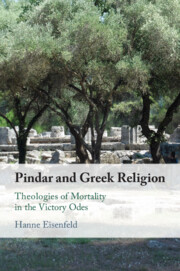Book contents
- Pindar and Greek Religion
- Pindar and Greek Religion
- Copyright page
- Dedication
- Contents
- Figures
- Acknowledgments
- Editions, Abbreviations, and Frequent References
- Chapter 1 Pindar Mythologus and Theologus
- Chapter 2 Herakles Looks Back at the World
- Chapter 3 The Dioskouroi in Existential Crisis
- Chapter 4 Exaltation at Akragas: Herakles, the Dioskouroi, and Theron
- Chapter 5 The Isolation of Amphiaraos
- Chapter 6 Asklepios and the Limits of the Possible
- Chapter 7 An Invitation
- References
- Subject Index
- Index Locorum
Chapter 2 - Herakles Looks Back at the World
(Isthmian 4; Nemeans 3 and 4)
Published online by Cambridge University Press: 18 November 2022
- Pindar and Greek Religion
- Pindar and Greek Religion
- Copyright page
- Dedication
- Contents
- Figures
- Acknowledgments
- Editions, Abbreviations, and Frequent References
- Chapter 1 Pindar Mythologus and Theologus
- Chapter 2 Herakles Looks Back at the World
- Chapter 3 The Dioskouroi in Existential Crisis
- Chapter 4 Exaltation at Akragas: Herakles, the Dioskouroi, and Theron
- Chapter 5 The Isolation of Amphiaraos
- Chapter 6 Asklepios and the Limits of the Possible
- Chapter 7 An Invitation
- References
- Subject Index
- Index Locorum
Summary
“Herakles Looks Back at the World,” argues that in Isthmian 4 and Nemeans 3 and 4 Pindar deploys Herakles’ biography as a framework for theological modeling by foregrounding the apotheosis as a salient feature of Herakles’ epinician identity. The motif of the pillars of Herakles informs the significance of the apotheosis, characterizing Herakles’ unparalleled passage from mortality to immortality as a break within the arc of his life, rather than as a reward analogous to the praise and exaltation enjoyed by the victor. This modeling emphasizes that the victor’s epinician exaltation belongs to the world of human experience, defined by mortality, a world that Herakles leaves behind with his apotheosis. The chapter emphasizes how Pindar’s theological modeling plays on the tensions and congruencies that develop between the depictions of Herakles within an ode and those already in play in the local landscape, demonstrating the distinct resonances evoked by the matrix of pillars and apotheosis at Thebes (Isth. 4) and at Aigina (Nems. 3 and 4).
- Type
- Chapter
- Information
- Pindar and Greek ReligionTheologies of Mortality in the Victory Odes, pp. 30 - 88Publisher: Cambridge University PressPrint publication year: 2022

